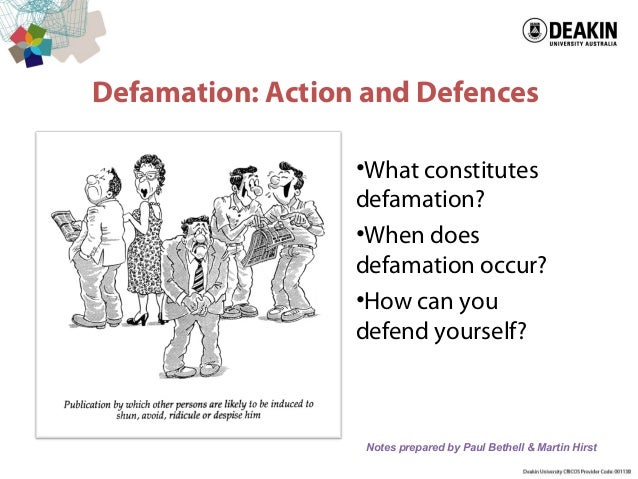What Constitutes Defamation
What Constitutes Defamation - Defamation is a false statement presented as a fact that causes injury or damage to the character of the person it is about An example is Tom Smith stole money from his employer If this is untrue and if making the statement damages Tom s reputation or ability to work it is defamation Defamation is a communication that injures a third party s reputation and causes a legally redressable injury The precise legal definition of defamation varies from country to country
What Constitutes Defamation

What Constitutes Defamation
Defamation is a statement that injures a third party's reputation. The tort of defamation includes both libel (written statements) and slander (spoken statements). State common law and statutory law governs defamation actions, and each state varies in their standards for defamation and potential damages . defamation, in law, the act of communicating to a third party false statements about a person that result in damage to that person’s reputation. Libel and slander are the legal subcategories of defamation. Generally speaking, libel is defamation in written words, pictures, or any other visual symbols in a print or electronic medium.
Defamation Wikipedia

The Title For What Statutes Defamation Of Character In Texas I Flow Below
What Constitutes DefamationDefamation happens when a person or business makes a false statement—verbally or in writing—about someone that damages their reputation. Defamation laws vary from state to state, but the basic elements of defamation are the same in every state. A plaintiff suing for defamation typically must show all of the following: Defamation meaning in law Defamation is a legal term that refers to any statement made by a person whether verbal or printed that causes harm to another person s reputation or character A defamatory statement made in writing or published it is considered libel a defamatory statement that is spoken is considered
Defamation is a civil wrong, like other personal injuries, consisting of statements that injure someone else’s reputation. When the statements are written, they are considered “libel,” while spoken defamation is “slander.” A person who is defamed can sue the person who said or wrote the defamatory statements. Covid 19 And Defamation Defamation Per Se Presumed Damages Winslow What Constitutes As Defamation
Defamation Definition Slander Vs Libel amp Facts Britannica

What Constitutes Defamation Shine Lawyers
Most states recognize that some categories of false statements are considered to be defamatory per se, such that people making a defamation claim for these statements do not need to prove that the statement caused them actual damages. (See section Defamation per se. ) Right To Remain Silent Without Prejudice
Most states recognize that some categories of false statements are considered to be defamatory per se, such that people making a defamation claim for these statements do not need to prove that the statement caused them actual damages. (See section Defamation per se. ) Types And Essentials Of Defamation Legal Study Material Defamation Claims Free Of Charge Creative Commons Suspension File Image

Supreme Court Judge Isaac Lenaola On what Constitutes Defamation Libel

What Constitutes Defamation Of Character Stone Group Lawyers

What Constitutes Defamation AskTheLawyers

How To Prevent Online Defamation Know what Constitutes Defamation As

What Constitutes Defamation On Social Media Rogers Norton Solicitors

Is It Worth Suing For Defamation Mullen Law Firm

Online Defamation Examples What Constitutes Online Defamation

Right To Remain Silent Without Prejudice

ALJ724 Defamation Lecture 2013

Social Media And Defamation LawBase